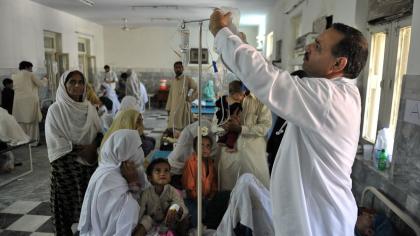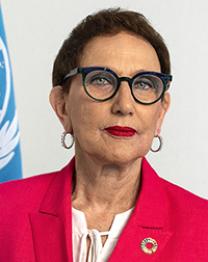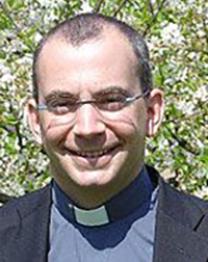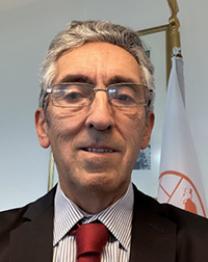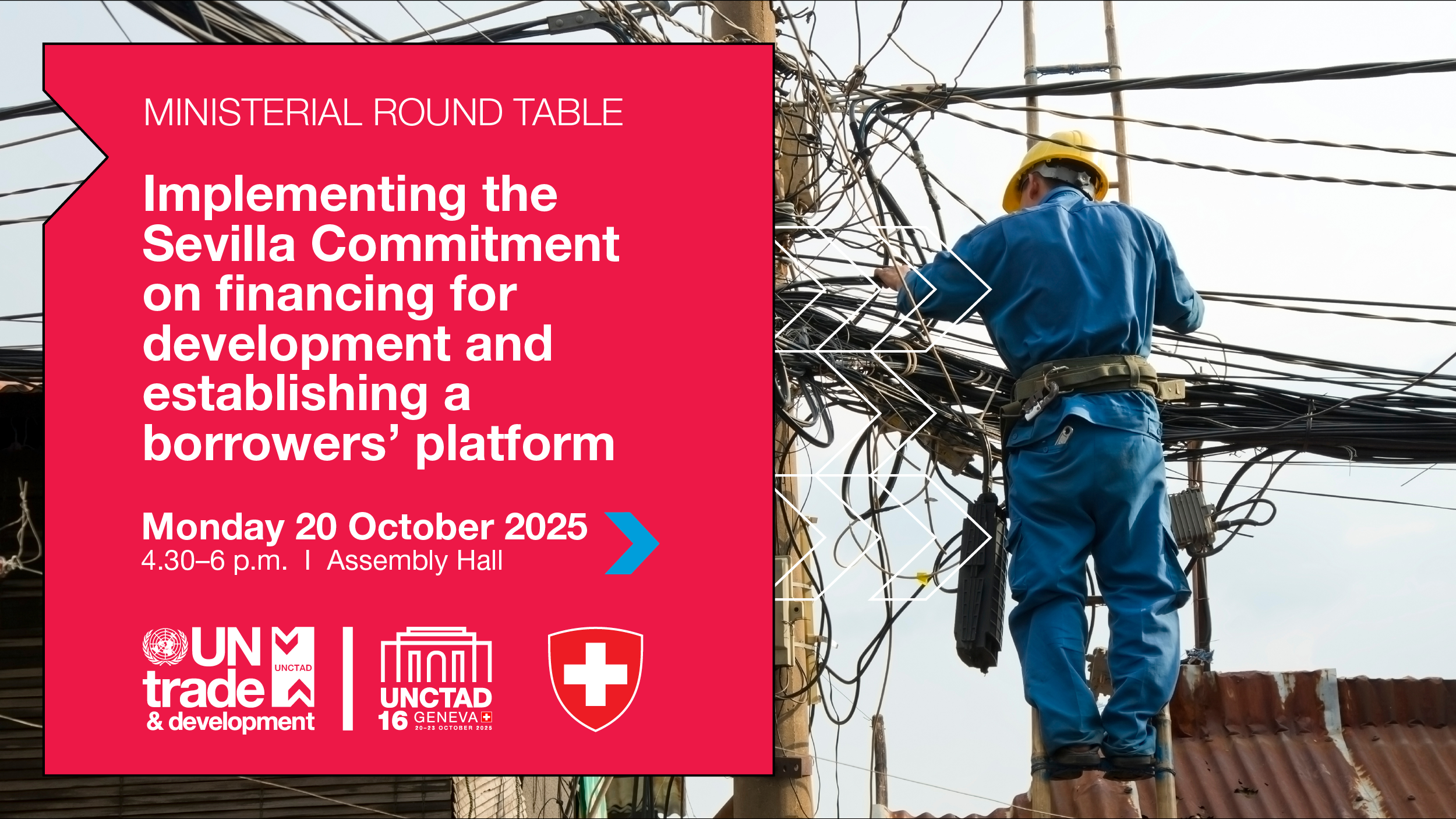
© UN Trade and Development (UNCTAD)
The Sevilla Commitment represents a comprehensive, agreed high-level agenda for the reform of the global financial architecture and mechanisms to finance sustainable development into the future. As the world deals with increasing challenges, ranging from economic instability and climate change to trade tensions and eroding multilateralism, the need to implement this commitment is more pressing than ever.
Discussions at the round table addressed practical steps for progressing on and implementing the key outcomes related to debt and development finance agreed during the Fourth International Conference on Financing for Development.
The first panel focused on the role of UNCTAD, given its expertise in financing for development research, intergovernmental consensus-building and technical assistance, in implementing the key reforms under the Sevilla Commitment. These reforms are aligned with the proposals of the United Nations Secretary-General’s Expert Group on Debt and the Africa Expert Panel of the Group of 20 established by South Africa, which holds the Group of 20 Presidency to 30 November 2025.
The establishment of a platform for borrower countries is a key agreed outcome under the Sevilla Commitment. Discussions at the second panel addressed how such a platform can assist borrower countries, the modalities for establishing such a platform, criteria for membership and how the challenges faced by similar initiatives in the past may be avoided.
Watch the ministerial roundtable on implementing the Sevilla Commitment on financing for development
Programme
Opening remarks: Rebeca Grynspan, Secretary-General, UN Trade and Development (UNCTAD)
Panel 1: Implementing the key elements of the Sevilla Commitment related to debt and development finance
There are pronounced asymmetries in the international financial architecture that result in developing countries facing significantly higher borrowing costs than developed countries, having less favourable access to the global financial safety net and being unable to access effective debt workout mechanisms when required. The Sevilla Commitment includes agreements on several key reforms to the international debt and finance architecture that aim to address these shortcomings.
Questions
- Which agreed reforms to the global financial architecture included in the Sevilla Commitment are critical in addressing development finance challenges facing developing countries?
- What support and facilitation can UNCTAD provide towards the implementation of such outcomes?
- How can developing countries cooperate to enable better responses to debt and finance challenges?
- What can developing countries do to ensure the best financing for development outcomes?
Speakers
- Elmer José Germán Gonzalo Schialer Salcedo, Minister of Foreign Affairs, Peru
- Inés Carpio San Román, General Director of International Finance, Ministry of the Economy, Trade and Business, Spain
- Daniel Pacho, Under Secretary for the Multilateral Sector, Holy See
Panel 2: Establishing a borrowers’ platform
The absence of a dedicated platform for borrower cooperation that elevates the collective voice of debtor countries, safeguards their interests and provides a repository of knowledge has long been recognized as a gap in the existing international debt and finance architecture. The Sevilla Commitment states that a platform for borrower countries will be established with support from existing institutions, and a United Nations entity serving as its secretariat.
Questions
- How can a borrowers’ platform contribute to more sustainable debt and development finance?
- What are the key challenges in establishing a borrowers’ platform and how can they be effectively addressed?
- What kind of support should the United Nations provide for a borrowers’ platform?
- What is the role of creditor countries and institutions in supporting the establishment and institutional continuity of a borrowers’ platform?
- What is required to move the initiative forward?
Speakers
- Ahmed Kouchouk, Minister of Finance, Egypt
- Paolo Gentiloni, Co-Chair of the Group of Experts to Promote Policy Solutions for Resolving the Debt Crisis, United Nations
- Carlos Correa, Executive Director, South Centre
Moderator: Penelope Hawkins, Officer in Charge, Debt and Development Branch, UN Trade and Development (UNCTAD)
Format: Davos-style
In September 2021, Rebeca Grynspan was appointed Secretary-General of the United Nations Conference on Trade and Development (UNCTAD), becoming the first woman to lead the organization in its 60-year history.
Rebeca Grynspan, an economist and former Vice President of Costa Rica, is an experienced leader of international institutions with a substantive track record in government, UN diplomacy, economic policy and multilateral cooperation at the global level.
Prior to joining the United Nations, she was Vice President of Costa Rica and held cabinet positions as Minister of Housing, Minister Coordinator of Economic and Social Affairs and Deputy Finance Minister.
Previously, she served as Secretary-General of the Ibero-American Conference (2014–2021), chairing regional summits of Heads of State and Government; United Nations Under-Secretary-General and Associate Administrator of the United Nations Development Programme (UNDP); and UNDP Regional Director for Latin America and the Caribbean. She was a member of the UN Commission for the Reconstruction of Haiti, representing the UN Secretary-General.
At UNCTAD, Grynspan has been at the centre of critical negotiations to address global trade and development challenges. She played a decisive role in the successful Black Sea Grain Initiative brokered between the UN, Türkiye, the Russian Federation and Ukraine, which enabled the safe export of over 32 million tons of grain, lowered global food prices by 22% and prevented millions from falling into food insecurity. She also leads the UN Global Crisis Response Group on food, energy and finance, and has represented the UN in G20 summits.
Her leadership has been recognized widely. In 2024, she received the Doha Negotiator of the Year Award for spearheading UN efforts to restore Black Sea trade routes. In 2025, Spain’s Ministry of Foreign Affairs, European Union and Cooperation awarded her the inaugural Isabel Oyarzábal Women in Multilateralism International Prize for her contribution to multilateralism.
Ms. Grynspan holds degrees in economics from the University of Costa Rica and the University of Sussex, and honorary doctorates from several European universities.
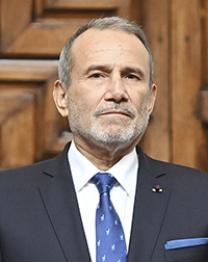
Elmer José Germán Gonzalo Schialer Salcedo is a Peruvian diplomat and professor who has served as the Minister of Foreign Affairs since 2024.
Prior to his current role, he held several important positions, including Executive Director of the Peru Chapter of the Binational Development Plan for the Peru-Ecuador Border Region in 2024, and Secretary General of Foreign Affairs from 2023 to 2024.
He was also the Ambassador of Peru to the Federal Republic of Germany from 2017 to 2023 and served as the Director General of the General Secretariat of the Andean Community from 2014 to 2017, where he led reform efforts to relaunch the organization.
Schialer’s career includes serving as the Director of International Economic Negotiations from 2011 to 2014, overseeing trade negotiations and managing relations with international organizations such as the Organisation for Economic Co-operation and Development (OECD) and the World Trade Organization (WTO), as well as issues related to the United Nations Conference on Trade and Development (UNCTAD).
He was also the National Director of the Initiative for the Integration of Infrastructure in South America (IIRSA) from 2002 to 2004, and held positions including Deputy Director in the Directorate for Europe in 2002 and Director of Middle Eastern and African Affairs in 2001.
On the international stage, Ambassador Schialer served as the Deputy Permanent Representative of Peru to the International Organizations based in Geneva, Switzerland, from 2007 to 2011, where he managed matters related to development, trade, intellectual property, disarmament, and humanitarian law.
His experience also includes roles at Peruvian embassies in Washington, La Paz, and Mexico, as well as in the Peruvian Mission to the United Nations in New York. He was the Consul General in Frankfurt, Germany, from 1999 to 2002.
Schialer has participated in significant international negotiations, including the Trans-Pacific Partnership Agreement (TPP) and agreements concerning biodiversity and disarmament.
He holds a degree in International Relations from the Diplomatic Academy of Peru and a Master's degree in Economics from the Pontifical Catholic University of Peru (PUCP). Additionally, he has completed postgraduate studies in Systems Engineering at the National University of Engineering.
H.E. Mr. Ahmed Kouchouk was appointed the Minister of Finance of Egypt in July 2024. He served as the Vice Minister of Finance for Fiscal Policies and institutional Reform from March 2016 to July 2024. Since then, he has been playing a leading role in planning and implementing Egypt’s macroeconomic and fiscal policies and reforms. He has also been the Chief Negotiator and Government focal point with the IMF since 2016.
He served as a Board Member at the Central Bank of Egypt from April 2016 to June 2018, at Egypt Air Holding Company from 2018-2020 and at Misr Fertilizers Production Company (MOPCO) from 2021- April 2022. He had been also entitled as a board member in several other institutions over the past years.
Mr. Ahmed Kouchouk is a professional economist and policy advisor with almost 25 years of applied experience. He worked as a Senior Economist for the World Bank from June 2013 to March 2016. Furthermore, he worked for the Ministry of Finance in several leading roles for more than 14 years including as the Vice Minister, the Economic Advisor, and the Director of the Macro Fiscal Unit. He also served for the Ministry of External Trade and the Ministry of Economy in Egypt.
He earned his master’s degree in public policy from Harvard Kennedy School of Government in 2010 and a master’s degree in economics from York University in the United Kingdom in 2002. He also had a B.S., in Economics in 1999 from the American University in Cairo.
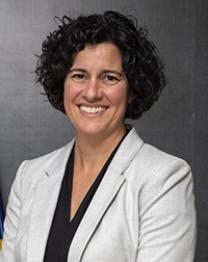
Mrs. Carpio is responsible for the coordination and the representation of Spain in international financing matters, particularly in its relations with the European Union and the international financial institutions. Her department also manages the external debt that the Spanish State holds as a creditor, the negotiation, restructuring, conversion and management, bilateral and multilateral, of the same and the representation of Spain in the Paris Club.
Mrs. Carpio is Alternate Governor for Spain at the African Development Bank, the Asian Development Bank and the Inter-American Development Bank. She is also Director for Spain in the Board of Directors of the European Investment Bank.
Prior to her appointment Mrs. Carpio held different positions, in the Ministry of Finance, in the Ministry of Economy, in the Ministry of Trade and in the Economic Office of the President of the Government.
She is a member of the High Corps of Spanish State Economists and Trade Experts, the senior officials in charge of the management of the Economic and Trade Policies in Spain. She holds a degree in Economics from the Universidad Autónoma de Madrid.
Reverend Msgr. Daniel Pacho was appointed Undersecretary at the Multilateral Sector of the Section for Relations with States and International Organizations of the Secretariat of State in January 2023.
Before that, he served as an official in the Section for Relations with States and International Organizations of the Secretariat of State. A position he held from January 2018.
He entered the diplomatic service of the Holy See on 1 July 2010, serving in the Pontifical Representations in Benin and Tanzania.
The Reverend Msgr. Pacho, was ordained a priest for the diocese of Fulda on 25 June 2000. He holds a degree in theology from the Pontifical Gregorian University in Rome.
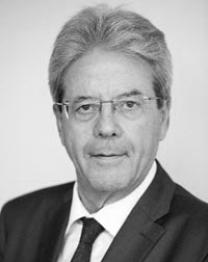
Paolo Gentiloni served as European Commissioner for Economy from 2019 to 2024.
In December 2024, the United Nations Secretary-General appointed him Co-Chair of the Group of Experts to Promote Policy Solutions for Resolving the Debt Crisis. He is also a nonresident Distinguished Fellow at the Brookings Institution.
Previously, he served as Prime Minister of Italy (2016–2018), Minister of Foreign Affairs and International Cooperation (2014–2016), and Minister of Communications (2006–2008).
From 2001 to 2019, Gentiloni was a member of the Italian Parliament, where he served as Chairman of the Broadcasting Services Watchdog Committee (2005–2006) and as a Member of the Foreign Affairs Committee (2013–2014).
Earlier in his career, he worked as a professional journalist and served as a Councillor for the City of Rome (1993–2000).
He was also one of the 45 founding members of the Democratic Party (Partito Democratico – PD) and led the party as its President from 2018 to 2019.
Born in 1954, he graduated in Political Science from La Sapienza University in Rome. His most recent book is La sfida impopulista (The (Un)populist Challenge, Rizzoli).
Dr. Carlos María Correa of Argentina has been Executive Director of the South Centre, an intergovernmental organization based in Geneva, since 1 July 2018.
Prior to this, he was the Special Advisor on Trade and Intellectual Property of the South Centre. Dr. Correa is a renowned international authority on intellectual property and technology issues.
Professor Correa has worked with the Argentine government and has been the Director of the Center for Interdisciplinary Studies on Industrial Property and Economics (CEIDIE) at the Law Faculty of the University of Buenos Aires. He was a member of the UK Commission on Intellectual Property Rights, the Commission on Intellectual Property Rights, Innovation and Public Health established by the World Health Assembly and of the FAO Panel of Eminent Experts on Ethics in Food and Agriculture.
He has been a visiting professor in post-graduate courses of several universities and consultant to various regional and international organizations. He has advised several governments on intellectual property, innovation policy and public health. He is the author of several books and numerous articles.
Professor Correa is both a lawyer and economist from the University of Buenos Aires and holds a PhD in Law from the University of Buenos Aires.
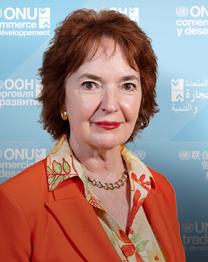
Penelope Hawkins is the Officer-in-Charge of the Debt and Development Finance Branch within UN Trade and Development (UNCTAD), a branch that includes the Debt and Development Finance Research Unit as well as the Debt Management and Financial Analysis System (DMFAS) Programme, which currently facilitates the debt recording and management in over 60 developing countries.
In her current position, Ms. Hawkins researches and engages with member country representatives and the broader civil and academic society on sustainable sovereign debt, financing for development, and the nexus between debt and climate finance. She represents UNCTAD at the G20 International Financial Architecture Working Group meetings and is the G20 Finance Deputy to UNCTAD Secretary-General Rebeca Grynspan. She also represents UNCTAD in several fora, including most recently at the Fourth International Finance for Development Conference (FFD4), G24 meetings in Washington DC and BRICS meetings.
Previously, as the founder and Managing Director of Feasibility (Pty) Ltd, Ms. Hawkins undertook leading research projects in the financial sector in Southern Africa, commissioned by regulators, policy makers and the private sector.
Her expertise in the financial sector stems from her published work. She holds a PhD in economics from the University of Stirling, Scotland, and an M.A. in economics (cum laude) from the University of South Africa.



